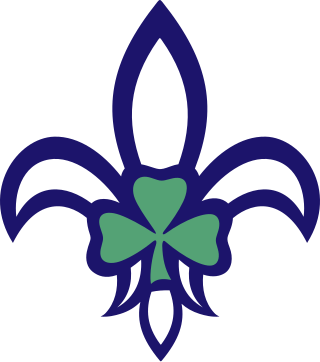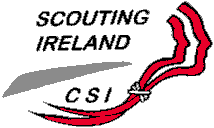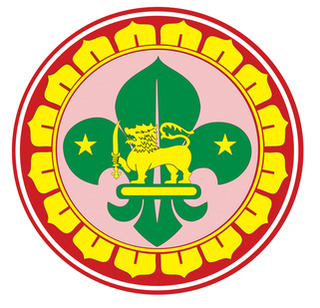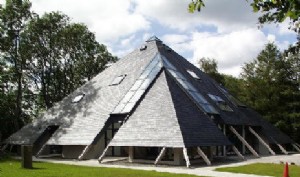
Scouting, also known as the Scout Movement, is a worldwide youth social movement employing the Scout method. It is a program of informal education with an emphasis on practical outdoor activities, including camping, woodcraft, aquatics, hiking, backpacking, and sports. Another widely recognized movement characteristic is the Scout uniform, by intent hiding all differences of social standing in a country and encouraging equality, with neckerchief and campaign hat or comparable headwear. Distinctive uniform insignia include the fleur-de-lis and the trefoil, as well as merit badges and other patches.

The World Organization of the Scout Movement is the largest and, after the Order of World Scouts is the second oldest international scout organization, having been established in 1922. It has 176 members. These members are national scout organizations that founded WOSM or have subsequently been recognised by WOSM, which collectively have around 43 million participants. Its operational headquarters is in Kuala Lumpur, Malaysia while it is legally based in Geneva, Switzerland.

Malaysian Scouts Association, officially known as the Scouts Association of Malaysia, is the largest informal youth and educational organisation in Malaysia, and member of World Organization of the Scout Movement (WOSM).

Ringsend is a southside inner suburb of Dublin, Ireland. It is located on the south bank of the River Liffey and east of the River Dodder, about two kilometres east of the city centre. It is the southern terminus of the East Link Toll Bridge. Areas included in Ringsend are the south side of the Dublin Docklands, and at the west end is the area of South Lotts and part of the Grand Canal Dock area. Neighbouring areas include Irishtown, Sandymount and the Beggars Bush part of Ballsbridge to the south, and the city centre to the west. A key feature of the area is the chimneys of Poolbeg power station.

Scouting Ireland is one of the largest youth movements on the island of Ireland, a voluntary educational movement for young people with over 45,000 members, including over 11,000 adult volunteers early 2020. Of the 750,000 people between the ages of 6 and 18 in Ireland, over 6% are involved with the organisation. It was founded in 2004, following the amalgamation of two of the Scouting organisations on the island. It is the World Organization of the Scout Movement-recognised Scouting association in the Republic of Ireland. In Northern Ireland it operates alongside The Scout Association of the UK and the Baden-Powell Scout Association.

The Scout Association of Ireland (SAI; Irish: Cumann Gasógaíochta na hÉireann) was an Irish multi-denominational Scout association from 1908 until 2004, when it merged with the former Catholic Boy Scouts of Ireland to form Scouting Ireland. It was named "Scouting Ireland (SAI)" in the years leading up to the merger. The SAI was formed soon after the publication of Scouting for Boys and was affiliated to the British Boy Scout Association, which meant its members were mainly unionist and hence Protestant in background. After the 1920s partition of Ireland, the SAI remained organised in both the Republic of Ireland and Northern Ireland.

The Catholic Boy Scouts of Ireland (CBSI; Irish: Gasóga Caitliceacha na hÉireann) was an Irish Catholic Scouting organisation active from 1927 until 2004, when it formed Scouting Ireland by merging with the former Scout Association of Ireland (SAI), a non-denominational Scout organisation. The CBSI changed its name to "Catholic Scouts of Ireland" (CSI) when it admitted girls and to "Scouting Ireland (CSI)" in the run-up to the foundation of Scouting Ireland. It was active in both the Republic of Ireland and Northern Ireland.

The Scout Association of Hong Kong is the largest scouting organisation in Hong Kong. Scout training was first introduced in Hong Kong by Rev Spink of St Andrew's Church, Kowloon in 1909 and 1910 by the Protestant based Boys' Brigade, Chums Scout Patrols and British Boy Scouts. The Catholic St. Joseph's College, formed its Boy Scout Troop in 1913, and registered with the Boy Scouts Association of the United Kingdom in 1914. The Boy Scouts Association formed its Hong Kong Local Association in July 1915 which became its Hong Kong Branch. After changes to the name of the United Kingdom organisation in 1967, the branch name was changed to The Scout Association Hong Kong Branch. In 1977, The Scout Association of Hong Kong was constituted as an autonomous association and successor to The Scout Association's Hong Kong Branch and became the 111th member of the World Organization of the Scout Movement (WOSM) in 1977.
Scouting and Guiding in mainland China was reported as banned with the establishment of the People's Republic of China (PRC) by the Communist Party since 1949. Instead, the Young Pioneers of China and the Communist Youth League, led by the Communist Party, have become the dominant youth organization in mainland China for younger and older youth, respectively. However, China now has multiple and originally separate Scouting activities within its borders. In 2004, the Scout Club of Hainan (海南童子军俱乐部), borrowing heavily from Scouting in terms of emblems, uniforms and activities, was founded in Hainan Province; it is, however, not affiliated with worldwide Scouting. An attempt to organize a nationwide Scouting organization in Wuhan was ended by the government in 2004. The Scout Association of the People's Republic of China (中华人民共和国童军总会), founded in 2008 serves Venture Scouts in both genders as well as Rover Scouts. The Rover Explorer Service Association operate groups in China.

Scouting Nederland is the national Scout organisation of the Netherlands with approximately 110,000 members (53,324 male and 54,663 female, 87,000 youth members, as of 2010.

The Sri Lanka Scout Association, is a Scouting organization in Sri Lanka operated by the Ceylon Scout Council. The Ceylon Scout Council is a corporation formed by Act No. 13 of 1957. The association became a member of the World Organization of the Scout Movement in 1953. The coeducational Sri Lanka Scout Association has 33,709 members as of 2014. in 2016 the year that the National Organisation reached 104 years the Scouting Population in Sri Lanka had increased to 55,078 the growth taking place against the year 2015 was 29% which was a great achievement by the SLSA.

Larch Hill International Scout and Guide Centre is the national campsite, and administrative and training headquarters, of Scouting Ireland. It was previously owned by Scouting Ireland (CSI), one of the two scout organisations which merged to form Scouting Ireland.

Sea Scouting has existed in Ireland since 1912 and is a programme framework within Scouting Ireland.

There are various controversies and conflicts that involve the Scouting movement. Scouting has sometimes become entangled in social controversies such as in nationalist resistance movements in India. Scouting was introduced to Africa by British officials as an instrument of colonial authority but became a subversive challenge to the legitimacy of British imperialism as Scouting fostered solidarity amongst African Scouts. There are also controversies and challenges within the Scout Movement itself such as current efforts to turn Scouts Canada into a democratic organization.
The Scout and Guide movement in Malta is served by three organizations:
The Scout and Guide movement in Jamaica is served by

Sir Francis Patrick Fletcher-Vane, 5th Baronet was an Irish-born British Army officer and baronet. Francis became the 5th Baronet of Hutton on the death in 1908 of his first cousin, Sir Henry Ralph Fletcher-Vane, 4th Baronet.

Scouting and Guiding in Gibraltar exist as branches of the parent organisations in the United Kingdom.
Sea Scouting has existed in Scouting Ireland and its predecessor associations since 1912. Sea Scout Groups are members of the World Organization of the Scout Movement (WOSM) through their membership of Scouting Ireland. Sea Scouting provides Scout training with and through water-borne activities.















